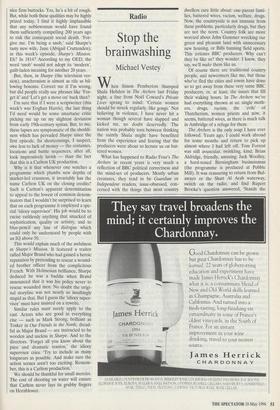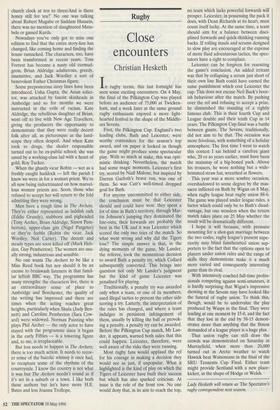Radio
Stop the brainwashing
Michael Vestey
When Simon Pemberton thumped Shula Hebden in The Archers last Friday night, a line from Noel Coward's Private Lives sprang to mind: 'Certain women should be struck regularly, like gongs.' Not believing in violence, I have never hit a woman though several have slapped and kicked me, no doubt deservedly. The nation was probably torn between thinking the saintly Shula might have benefited from the experience and fearing that the producers were about to lecture us on bat- tered women.
What has happened to Radio Four's The Archers in recent years is very much a reflection of BBC political correctness and the mind-set of producers. Mostly urban creatures, they tend to be Guardian or Independent readers, issue-obsessed, con- cerned with the things that most country dwellers care little about: one-parent fami- lies, battered wives, racism, welfare, drugs. Now, the countryside is not immune from these problems, particularly drugs, but they are not the norm. Country folk are more worried about John Gummer wrecking our green and pleasant land with unnecessary new housing, or Bills banning field sports. This irritates BBC producers. Why can't they be like us? they wonder. I know, they say, we'll make them like us.
Of course there are traditional country people, and newcomers like me, but those who've fled the cities and towns have done so to get away from these very same BBC producers, or, at least, the issues that fill their waking hours. In The Archers we've had everything thrown at us: single moth- ers, drugs, racism, the 'evils' of Thatcherism, women priests and now, it seems, battered wives, as there is much talk in Ambridge of a refuge for them.
The Archers is the only soap I have ever followed. Years ago, I could work abroad for some months and return to pick up almost where I had left off. Tom Forrest was still avuncular, twinkling, kind; Brian Aldridge, friendly, amusing; Jack Woolley, a hard-nosed Birmingham businessman (the programme is produced at Pebble Mill). It was reassuring to return from Bul- awayo or the Shatt Al Arab waterway, switch on the radio, and find Rupert Brooke's question answered, 'Stands the church clock at ten to three/And is there honey still for tea?' No one was talking about Robert Mugabe or Saddam Hussein, there was no mention of slaughtered Mata- bele or gassed Kurds.
Nowadays you've only got to miss one edition to find that the entire story-line has changed, like coming home and finding the house ransacked. The characters, too, have been transformed in recent years. Tom Forrest has become a nasty old curmud- geon, Brian Aldridge adulterous, greedy, insensitive, and Jack Woolley a sort of benevolent Father Christmas figure.
Some preposterous story lines have been introduced. Usha Gupta, the Asian solici- tor, was attacked by fascist skinheads in Ambridge and so for months we were instructed in the evils of racism. Kate Aldridge, the rebellious daughter of Brian, went off to live with New Age Travellers, giving the producers the opportunity to demonstrate that they were really decent folk after all, as picturesque as the land- scape they often despoil. And when Kate took to drugs, the dealer responsible turned out to be ex-public school; she was saved by a working-class lad with a heart of gold, Roy Tucker.
When the ghastly vicar Robin — wet as a freshly caught haddock — left the parish I knew we were in for a woman priest. We're all now being indoctrinated on how marvel- lous women priests are. Soon, those who refused to accept her will return to the fold admitting they were wrong.
Men have a rough time in The Archers. They're either represented as laddish oafs (Eddie Grundy), stubborn and pigheaded (Tony Archer, Brian Aldridge, Simon Pem- berton), upper-class gits (Nigel Pargeter) or they're feeble (Robin the vicar, Jack Woolley, Neil Carter). The decent and steady types are soon killed off (Mark Heb- den, Guy Pemberton). The women are usu- ally strong, industrious and sensible.
No one wants Tice Archers to be like a Miss Reed book but nor should it be an excuse to brainwash listeners in that famil- iar leftish BBC way. The programme has many strengths: the characters live, there is an extraordinary sense of place to Ambridge and Borchester, the quality of the writing has improved and there are times when the acting reaches great heights, particularly when Shula (Judy Ben- nett) and Caroline Pemberton (Sara Cow- ard) were widowed. Norman Painting who plays Phil Archer — the only actor to have stayed with the programme since it began in the early Fifties — is a towering figure and, to me, is irreplaceable.
But less needs to happen in The Archers; there is too much action. It needs to recov- er some of the bucolic whimsy it once had, to recapture some of the rhythms of the countryside. I know the country is not what it was but The Archers needn't sound as if it's set in a suburb or a town. I like both these authors but let's have more H.E. Bates and less Joanna Trollope.



































































 Previous page
Previous page